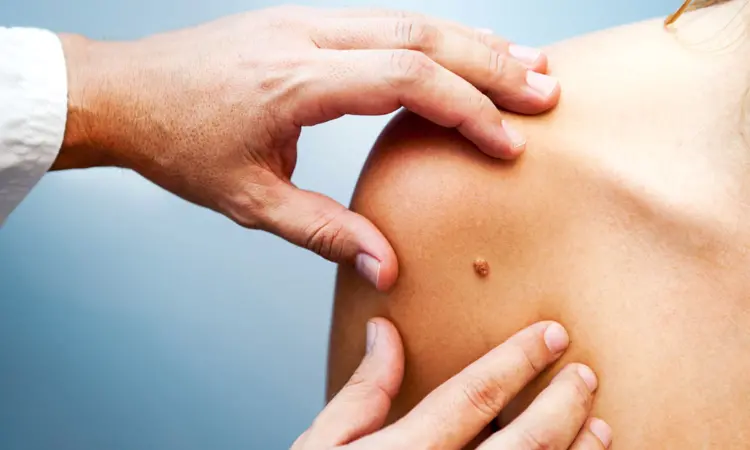- Home
- Medical news & Guidelines
- Anesthesiology
- Cardiology and CTVS
- Critical Care
- Dentistry
- Dermatology
- Diabetes and Endocrinology
- ENT
- Gastroenterology
- Medicine
- Nephrology
- Neurology
- Obstretics-Gynaecology
- Oncology
- Ophthalmology
- Orthopaedics
- Pediatrics-Neonatology
- Psychiatry
- Pulmonology
- Radiology
- Surgery
- Urology
- Laboratory Medicine
- Diet
- Nursing
- Paramedical
- Physiotherapy
- Health news
- Fact Check
- Bone Health Fact Check
- Brain Health Fact Check
- Cancer Related Fact Check
- Child Care Fact Check
- Dental and oral health fact check
- Diabetes and metabolic health fact check
- Diet and Nutrition Fact Check
- Eye and ENT Care Fact Check
- Fitness fact check
- Gut health fact check
- Heart health fact check
- Kidney health fact check
- Medical education fact check
- Men's health fact check
- Respiratory fact check
- Skin and hair care fact check
- Vaccine and Immunization fact check
- Women's health fact check
- AYUSH
- State News
- Andaman and Nicobar Islands
- Andhra Pradesh
- Arunachal Pradesh
- Assam
- Bihar
- Chandigarh
- Chattisgarh
- Dadra and Nagar Haveli
- Daman and Diu
- Delhi
- Goa
- Gujarat
- Haryana
- Himachal Pradesh
- Jammu & Kashmir
- Jharkhand
- Karnataka
- Kerala
- Ladakh
- Lakshadweep
- Madhya Pradesh
- Maharashtra
- Manipur
- Meghalaya
- Mizoram
- Nagaland
- Odisha
- Puducherry
- Punjab
- Rajasthan
- Sikkim
- Tamil Nadu
- Telangana
- Tripura
- Uttar Pradesh
- Uttrakhand
- West Bengal
- Medical Education
- Industry
Vitamin D insufficiency tied to increased incidence of cutaneous melanoma

USA: Findings from a meta-analysis suggest the importance of identifying vitamin D insufficiency for evaluating and treating patients at a higher risk of developing cutaneous melanoma (CM).
The researchers, in their study published in Melanoma Research, identified an association between increased incidence of cutaneous melanoma and vitamin D insufficiency. They also observed less favourable Breslow tumour depth with lower vitamin D levels and the presence of vitamin D insufficiency.
The study showed that a vitamin D level <20 ng/dL was linked with an increased incidence of cutaneous melanoma (RR, 1.45). A vitamin D level >20 ng/dL was correlated with Breslow depth <1 mm and a lower vitamin D level was associated with Breslow depth >1 mm.
Cutaneous melanoma is the deadliest skin cancer, and vitamin D insufficiency has been indicated as a risk factor. Richard A Shellenberger, Trinity Health Ann Arbor Hospital, Ann Arbor, Michigan, and colleagues sought to explore the relationship between both vitamin D insufficiency and 25-hydroxy vitamin D levels with the incidence and stage of CM in a systematic review and meta-analysis.
For this purpose, the researchers searched five databases from inception until 11 July 2022. Case-control and cohort studies that reported mean 25-hydroxy vitamin D levels or the presence of vitamin D insufficiency in CM patients and compared with healthy controls; or those that reported vitamin D insufficiency and Breslow tumour depth or the development of metastasis in CM were included. A total of fourteen studies were included in the analysis.
The authors reported the following findings:
- Statistically significant relationships were found between vitamin D level <20 ng/dl and incidence of CM [pooled RR 1.45; lower mean vitamin D level and Breslow depth >1 mm (SMD 0.19); and vitamin D level >20 ng/dl and Breslow depth <1 mm (pooled RR 0.69).
- Statistical significance was not found in the relationships between vitamin D levels and the presence of metastasis (pooled SMD −0.13); or mean vitamin D level and the incidence of CM (pooled SMD −0.39).
"Identification of vitamin D insufficiency may be critical for evaluating and treating patients at a higher risk of developing CM," the researchers concluded.
Reference:
Shellenberger, Richard A.a; Gowda, Sunainaa; Kurn, Heidia; Albright, Jeremyb; Mayo, MacKenzie H.a. Vitamin D insufficiency and serum levels related to the incidence and stage of cutaneous melanoma: a systematic review and meta-analysis. Melanoma Research 33(4):p 265-274, August 2023. | DOI: 10.1097/CMR.0000000000000897
Dr Kamal Kant Kohli-MBBS, DTCD- a chest specialist with more than 30 years of practice and a flair for writing clinical articles, Dr Kamal Kant Kohli joined Medical Dialogues as a Chief Editor of Medical News. Besides writing articles, as an editor, he proofreads and verifies all the medical content published on Medical Dialogues including those coming from journals, studies,medical conferences,guidelines etc. Email: drkohli@medicaldialogues.in. Contact no. 011-43720751


